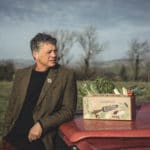Over lunch in the canteen, I asked our Head of Supply Chain, Dale, when the first new potatoes from Devon and Cornwall would be in your boxes. “July,” he said. I almost choked. What about potatoes from Jersey? “Oh yeah, those are doing OK – Jersey Royals are on sale now.” So why do we not have any from our growers on the UK mainland? Where’s Paul Badcock? “He quit. His farm sale was last month.” What about the Tuckers, what about the Trips, what about the Rogers? “They all quit.”
Family farms around the coasts of Devon, Cornwall, Pembrokeshire, and Kent have been growing early potatoes, followed by winter cauliflowers, for generations. The warm sea air protects the crops from frost, and seaweed from the beaches below was traditionally used to fertilise the soil. But as imports from countries with warmer climates and lower wages became available, this once-prosperous rotation fell into decline. First the smallest, hand-and-horse cultivated, terraced fields were abandoned, and then those that could not accommodate the ever-growing machinery needed to compete at declining prices.
The year’s first Jersey Royal potatoes continue, against all odds, to be grown on ridiculously steep, machinery-defying slopes leading down to the cliffs. Many are still picked by hand, after using winch-drawn ploughs to expose the tubers. The industry’s survival depends on their price-preserving EU Protected Designation of Origin (PDO) status, with the first liftings selling for up to £10,000 per tonne.
Paul Badcock farmed on the ‘Golden Mile’ near Penzance – some of the most prized land in Cornwall, thanks to its early seasons. The last straw for him was not price, but the challenge of finding labour willing to cut cauliflowers in January mud and rain. The loss of experienced growers like Paul is compounded by the progressive loss of the skilled, hard-working Eastern Europeans who have been the backbone of our industry for three decades. This year, at Riverford, we lose our two stalwart Mariuses: one is returning to Lithuania to grow veg of his own, the other is switching to an easier life as an MOT inspector. Without a long-term workforce plan for UK farming, replacing the likes of Marius, Marius, and Paul will be near impossible. Seeing them leave our industry feels like turning the last page of a much-loved book.
















Very though provoking & poignant.
Guy and other farmers – so sorry for the anxiety you all must be feeling in the UK, and elsewhere obvs, about the dire stare of much of your soil after the almost constantly wet winter/spring. You might get some attention when the public can’t find stuff in supermarkets, mebbe.
But while I’m empathising, could you explain why Riverford is sourcing fruit from Argentina? Baffles me how that is good for our climate.
horrifying and saddening.